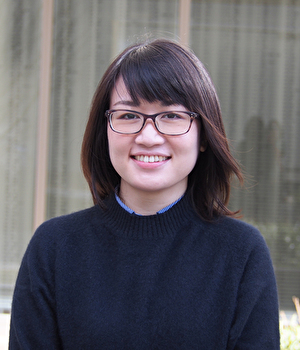
赤塚 京子
Kyoko Akatsuka, PhD
特定助教
専門:生命倫理学
私はこれまで、親が先端的な生殖医療技術を用いて、「望ましい」遺伝形質や特性を持った子供をつくることに関する倫理について研究を進めてきました。
iPS細胞の登場以来、将来の生殖医療への期待は高まりつつありますが、既に様々な倫理的問題が指摘されています。それらの問題を社会で共有し、議論していくためにも、そこで問われている問題がそもそもどのようなものであり、どのような点に配慮しながら考えていく必要があるのか、そういったことをきちんと伝えられるような研究をしていきたいと思います。
略歴
2010年 立命館アジア太平洋大学 アジア太平洋学部 卒業
2012年 京都大学大学院 人間・環境学研究科 共生人間学専攻 修士課程修了
2014年 日本学術振興会 特別研究員(DC2)
2017年 京都府立医科大学 医学生命倫理学 人文・社会科学教室 博士研究員
2017年 京都大学大学院人間・環境学研究科 共生人間学専攻 博士課程修了
2018年 京都大学iPS細胞研究所 上廣倫理研究部門 特定研究員
主な研究成果
論文
- Sasaki-Honda M, Akatsuka K, Sawai T. Is epigenome editing non-inheritable? Implications for ethics and the regulation of human applications. Stem Cell Reports. 2023; 18(11): 2005–2009. DOI: 10.1016/j.stemcr.2023.10.003.
- Sawai T, Hatta T, Akatsuka K, Fujita M. Human genome editing in clinical applications: Japanese lay and expert attitudes. Frontiers in Genetics. 2023; 14:1205092. DOI: 10.3389/fgene.2023.1205092.
- Akatsuka K, Hatta T, Sawai T, Fujita M. Genome editing of human embryos for research purposes: Japanese lay and expert attitudes. Frontiers in Genetics. 2023; 14:1205067. DOI: 10.3389/fgene.2023.1205067.
- Sawai T, Akatsuka K, Okui G, Minakawa T. The regulation of human blastoid research: A bioethical discussion of the limits of regulation. EMBO Reports. 2022; e56045. DOI: 10.15252/embr.202256045.
- Sawai T, Hatta T, Akatsuka K, Fujita M. Public attitudes in Japan toward the creation and use of gametes derived from human-induced pluripotent stem cells. Future Science OA. 2021; DOI: 10.2144/fsoa-2021-0066.
- Akatsuka K, Hatta T, Sawai T, Fujita M. Public attitudes in Japan toward the reproductive use of gametes derived from human-induced pluripotent stem cells. Future Science OA. 2021; DOI: 10.2144/fsoa-2021-0065.
- Sawai T, Okui G, Akatsuka K, Minakawa T. The Implications of Rethinking the 14-day Rule for Research on Human Embryos. EMBO Reports. 2021; DOI: 10.15252/embr.202153726.
- Akatsuka K, Sasaki-Honda M, Sawai T. Ethical framework for next-generation genome and epigenome editing. The American Journal of Bioethics. 2020; 20(8): 32-36. DOI: 10.1080/15265161.2020.1782524.
- Sawai T, Minakawa T, Pugh J, Akatsuka K, Yamashita J.K, Fujita M. The moral status of human embryo‐like structures: potentiality matters?. EMBO Reports. 2020; DOI: 10.15252/embr.202050984.
- 赤塚京子(2016).「新優生学の『自由』について-デザイナー・ベビー議論における『開かれた未来への権利』の検討」.『いのちの未来』.(1)34-55.【査読有】
報告書
- Akatsuka K. 2016. Producing germ cells from induced pluripotent stem cells: The discussion in Japan. In Uehiro Carnegir Oxford Conference 2014 “Ethics For the Future of iPS/ Stem cells”. eds. J. Savulescu and M. Fujita. 29-36.
- 赤塚京子(2016).「日本におけるiPS細胞由来の生殖細胞作製をめぐる議論」.ジュリアン・サバレスキュ・藤田みさお編『Uehiro Carnegir Oxford Conference 2014 “Ethics For the Future of iPS/ Stem cells”』.225-230.
研究発表
- Akatsuka K. ‘Who will be excluded from “New Eugenics” ― Issues concerning “Liberty” and “Equality” emerging from discussion about designer babies,’ The Seventh International Conference on Applied Ethics (第7回 応用倫理国際会議), Hokkaido University, Sapporo. 2012. 10. 26. 【査読有】
- Akatsuka K. ‘New Eugenics’ insidious risk: A comparative analysis of proponents’ and opponents’ arguments about designer babies,’ 2013 Uehiro Cross-Currents Philosophy Conference, University of Hawaii, Manoa. 2013. 3. 8. 【査読有】
- 赤塚京子「新優生学思想における『自由』について―『開かれた未来への権利』を手掛かりに」第25回日本生命倫理学会年次大会 (東京大学, 東京) 2013. 11. 30. 【査読有】
- Akatsuka K. “Discussions of producing germ cells from induced pluripotent stem cells in Japan.” 2014 Uehiro-Carnegie-Oxford Ethics Conference. Kyoto, Japan. 2014. 8. 29.
- Sawai T, Akatsuka K, Specker L. “The ethics of research on stem cell derived gametes: A Japanese bioethical perspective.” The 17th Annual Meeting of the American Society for Bioethics and Humanities. Texas, USA. 2015. 10. 22. 【査読有】
